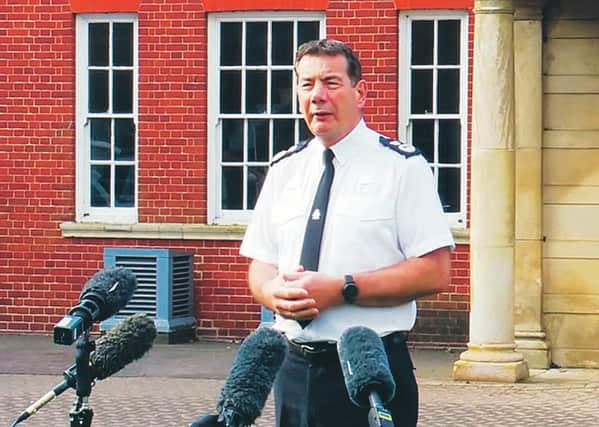Euan McColm: Why police need to be trusted not to cross the thin blue line


Addressing the media on the issue of policing during the coronavirus lockdown, Adderley seemed to be in the mood to reassure.
And then came the kicker.
“But again,” he added, “be under no illusion, if people do not heed the warnings and the pleas I’m making today, we will start to do that.”
Advertisement
Hide AdAdvertisement
Hide AdSuddenly, here was the vision of a Britain where masked police officers patrol our supermarkets, searching for those whose shopping they judge frivolous. In this dystopia, might possession of a three-pack of galaxy ripples be considered a crime? Could Haribo Tangfastics become as illicit as cocaine? Would officers stand in front of the Cheesy Wotsits, waving us away and declaring “nothing to see, here”?
Adderley’s force, in a public relations strategy that I’d describe as bold, later tweeted “to clarify some suggestions made in the media” and insisted that there would be no searching of shopping trolleys. The force ignored the fact that the only person suggesting such a thing in the media had been its own chief constable.
One person who was quite clear about who had suggested that cops might start searching shopping baskets was Home Secretary Priti Patel. Asked about Adderley’s remarks, she described them as inappropriate and at odds with government guidance.
Meanwhile, in Yorkshire, a police officer was filmed telling members of the public that they could not stand in their front garden. The only person in the wrong in this instance was the police officer who, in a bleakly comic video of the entirely unnecessary confrontation, is shown to be the only person anywhere near the people she is confronting over their approach to self-isolation.
There is nothing in emergency coronavirus legislation that restricts us from buying specific items from supermarkets or prevents us from standing in our gardens. The idea that there might be criminality in these instances is preposterous.
The instinct in the face of provocations such as these may be to make allowances. These are, after all, unprecedented times and surely now, more than ever, we should accept that to err is human.
This understandable reaction is, I think, the wrong one.
The circumstances in which we find ourselves are ripe for exploitation. Those whose instincts tend towards the authoritarian may see the opportunity to impose greater restrictions on our liberty. And so we must clearly reject any attempt by any police officer to overstep the mark.
It is in nobody’s interest for public and police to be at odds at any time, but now more than ever trust is crucial.
Advertisement
Hide AdAdvertisement
Hide AdNobody can be in any doubt that these are especially difficult times for police officers and other front-line public servants. Denied the ability to isolate with their families during lockdown, these men and women are putting themselves at vastly increased risk in the service and protection of others. The debt of gratitude we owe them is considerable. But we do not owe them compliance with instructions they have no authority to deliver.
And so the decision by the Chief Constable of Police Scotland, Iain Livingstone, to appoint an experienced QC to scrutinise the force’s use of any new powers is to be warmly welcomed.
John Scott will chair a group that will provide independent scrutiny of how officers and staff are applying new legislation. This, I hope, will mean that instances where police overstep the mark are dealt with promptly.
But Scott’s role is not that of witchfinder. We should, I think, be willing to accept that many – I’m sure the majority – of those officers who do get things wrong will have acted in good faith. Scott’s guidance should, if the system is working, ensure that those who screw up don’t do it again.
I was reassured when Livingstone’s deputy, Will Kerr, made a point of intervening in an online discussion about this matter last week to say that he understood and shared the belief that our current circumstances should not mean police overstepping the mark. “On the, hopefully very small, number of occasions where we get that balance wrong, we’re absolutely up for challenge and learning,” he wrote.
Credit to Kerr for recognising the issue and responding so unequivocally. This, I’m bound to say, is a level of communication from which the chief constable of Northamptonshire might learn a thing or two.
But I come not only to condemn the actions of a few police officers. It’s important to add, I think, that just as Kerr recognises the need for officers to get the balance right, a similar responsibility lies with us all. We may have the right to take a jaunt to the shops to load up on assorted junk but we are obliged – morally, if not legally – to consider whether that particular trip is necessary. Is our presence in a queue really unavoidable?
It is clearly still the case that too many members of the public are making the jobs of police and other front-line workers unnecessarily difficult.
Advertisement
Hide AdAdvertisement
Hide AdDespite concerted messages from UK and Scottish governments in recent days about the need to remain indoors, there is evidence that too many continue to ignore guidelines on social distancing. If you have made an urgent trip to the supermarket and managed, en route, to avoid the breeze of a panting jogger on your face as he passes from behind, then you should consider yourself very lucky, indeed.
We are, public and police alike, finding our way in these difficult times. We will – all of us – make mistakes. We will – all of us – do what we can to conceal our hypocrisies.
My instinct – and I’m sure yours – is to respect and accept the advice of police officers. For that to remain the case, those officers must not take advantage of the trust we place in them.